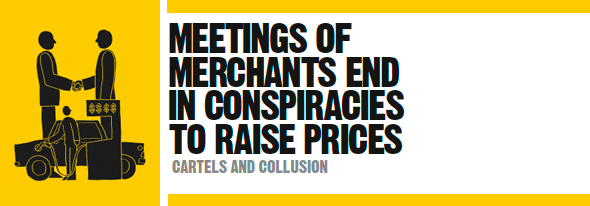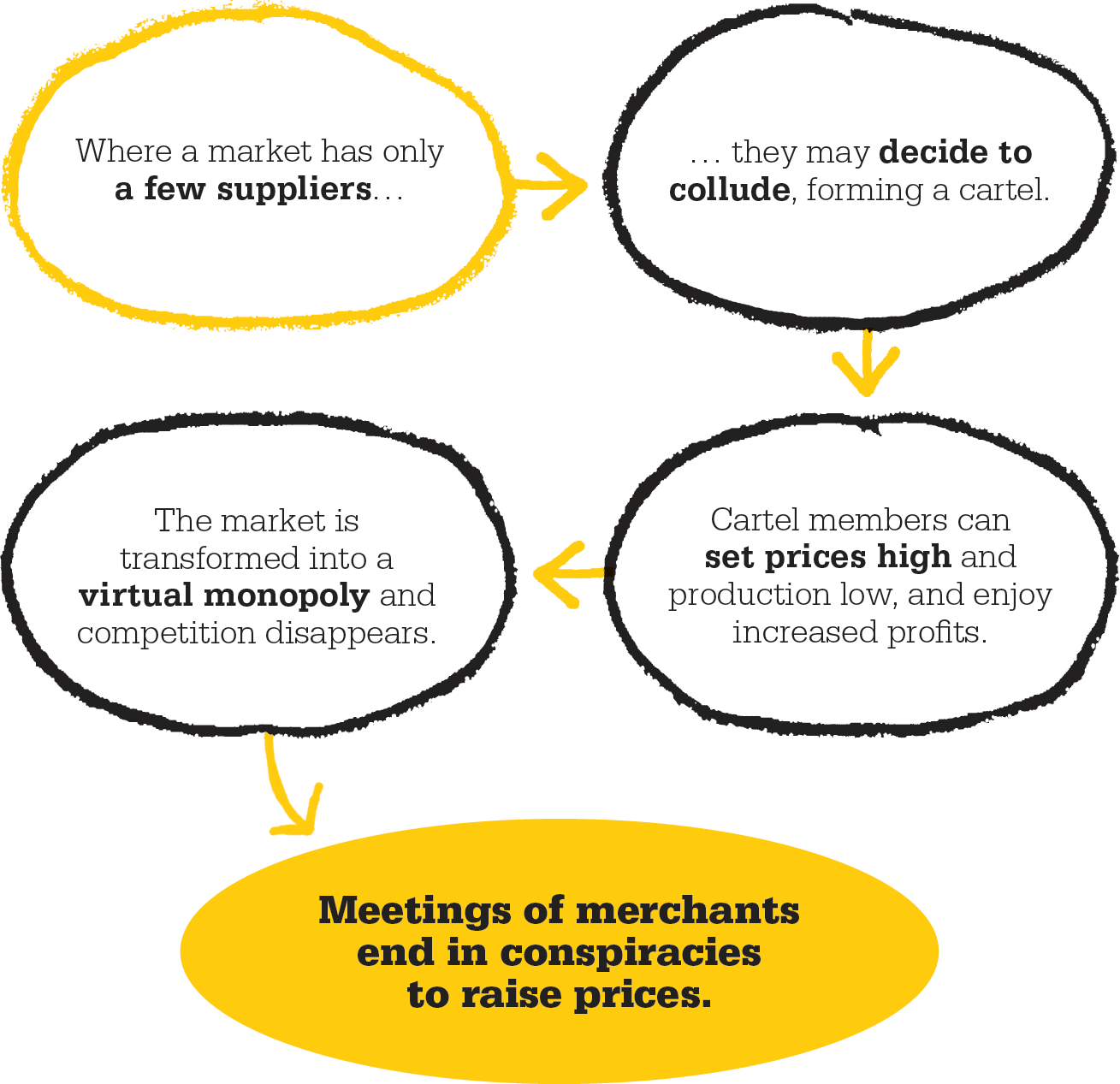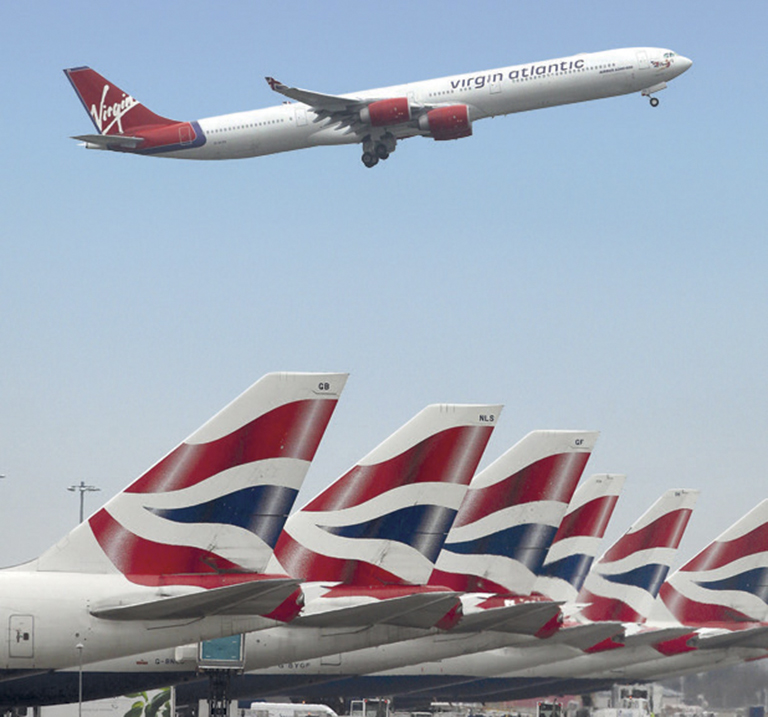

Markets and firms
Adam Smith (1723–90)
1290s Wenceslas II, Duke of Bohemia, introduces laws to prevent metal ore traders from colluding to raise prices.
1590s Traders from the Netherlands collaborate in a cartel with a monopoly of the spice trade in the East Indies.
1838 French economist Augustin Cournot describes competition in oligopolies.
1890 The first antitrust law is passed in the US.
1964 US economist George Stigler publishes A Theory of Oligopoly, examining the problems of maintaining successful cartels.
Competition is key to the efficient working of free markets. The presence of several producers in a market drives production and keeps prices down as each competes to attract customers. If there is only a single supplier—a monopoly—it can choose to restrict its output and charge higher prices.

Between these two extremes sits the oligopoly, where a few suppliers—sometimes only two or three—dominate the market for a particular product. Competition between producers in an oligopoly would clearly be in the interests of the consumer, but there is an alternative for the producers that may be more beneficial to their profit levels: cooperation. If they choose this route and can agree not to undercut one another, they can act collectively like a monopoly and dictate the terms of the market to their own benefit.
This sort of cooperation between firms is known by economists as “collusion.” The price fixing that results makes markets less efficient. Scottish economist Adam Smith recognized the importance of self-interest in free markets but was suspicious enough of the motives of suppliers to warn: “People of the same trade seldom meet together, even for merriment and diversion, but the conversation ends in a conspiracy against the public, or in some contrivance to raise prices.”
Collaborations between producers have existed for as long as there have been markets, and businesses in many areas of commerce have formed associations to their mutual benefit. In the US in the 19th century these restrictive or monopolistic practices were known as “trusts,” but the word “cartel” is now used to describe such collaborations, which operate on a national or international level. The word has gained a negative connotation despite being a notable feature of the German and US economies in the 1920s and 1930s.
In the 20th century the US and the European Union (EU) used legislation to discourage collusion. However, cartels among producers remain a feature of market economies. Collaborations might be a simple agreement between two firms, such as when Unilever and Procter & Gamble colluded to fix the price of laundry detergent in Europe in 2011, or they can take the form of an international trade association, such as the International Air Transport Association (IATA). The IATA’s original function was to set prices for fares, which led to accusations of collusion, but it still exists as a representative organization for the airline industry. Cartels can even be formed through cooperation between governments of countries producing a particular commodity, as happened in the case of the Organization of Petroleum Exporting Countries (OPEC), which was founded in 1960 to coordinate oil prices among member countries.
However, there are problems in setting up and sustaining a cartel, which focus around prices and trust between members. Participants in a cartel cannot simply fix prices. They also have to agree on output quotas to maintain those prices and, of course, the share of the profits. The fewer the members of a cartel, the easier these negotiations are. Cartels are more robust when there are a small number of firms accounting for most of the supply.
The second problem is ensuring that members of a cartel abide by the rules. Producers are attracted to collusion by the prospect of higher prices, but this self-interest is also the weakness of the arrangement. Individual members of a cartel may be tempted to “cheat” by overproducing and undercutting their collaborators. In effect, this is a version of the prisoner’s dilemma, in which two prisoners can each choose either to remain silent or confess. If both remain silent or both confess, they will receive light sentences; but if only one confesses, he will receive immunity while his partner in crime will get a heavy sentence. The best strategy for each of them is to remain silent (this incurs the shortest jail term), but the temptation is to opt for immunity and confess in the hope that the other does not. The strategies that apply here are equally applicable to cartels, where the rewards for all the players are greater if they collaborate than if they compete but are greatest for any one player who breaks the agreement, while the others suffer as a consequence.
In practice, this is what tends to happen within a cartel, particularly when the quotas are unequally divided. The 12 members of OPEC, for example, meet regularly to agree on output and prices, but these are seldom adhered to. The smaller, less wealthy members see the chance of gaining some extra profit and exceed their output quota, introducing an element of competitiveness and weakening the power of the cartel as a whole. It only takes one cheat to undermine the operation of a cartel, and the more members in the cartel, the greater the danger of the rules being broken.
Very often, one of a cartel’s members—the most powerful in terms of production—emerges as an “enforcer.” When the efficacy of OPEC becomes threatened, for instance, by a country such as Angola overproducing to increase its profits, Saudi Arabia, the largest member of the cartel, can take action to stop this. As the largest producer with the lowest production costs it can afford to increase production and lower prices to a level that will punish or may even bankrupt the smaller countries, while only lowering its own profits in the short term. However, in many cases, the temptation to cheat and the reluctance of the enforcer to reduce its profits eventually lead to the break-up of cartels.
"We must not tolerate oppressive government or industrial oligarchy in the form of monopolies and cartels."
Henry A Wallace
US politician (1888–1965)
The difficulty in forming and maintaining cartels means that these “conspiracies” are less common than Adam Smith might have expected. In the 1960s US economist George Stigler showed that the natural suspicion of competitors acts against collusion in a cartel, and that cartels are less likely to occur as more firms enter a market. As a result, even in industries where there are only a few large producers, such as for video games consoles and mobile phones, the preference is generally for competition rather than cooperation.
"Economists have their glories, but I do not believe that antitrust law is one of them."
George Stigler
Nevertheless, the few cartels that do exist pose enough of a threat to the market for governments to feel the need to intervene. Public pressure from consumers opposed to price-fixing drove the move to “antitrust” legislation during the 20th century, outlawing cartels in most countries. Because of the difficulty of proving collusion, many of these laws offer immunity to the first member of a cartel to confess—just as in the prisoner’s dilemma—offering yet another incentive to break up the cartel. This tactic was notably successful recently, when Virgin Atlantic Airlines, worried by an investigation into price-fixing of Atlantic flights, confessed its collusion with British Airways, who were heavily fined.

British Airways was fined $546 million for collusion in 2011, after Virgin Atlantic admitted that the two companies had met six times to discuss proposed price rises.

Mobile phone operators in the Netherlands were investigated for suspected cartel practices in 2011, including price-fixing mobile data bundles for prepaid phones.
Some libertarian economists, such as Stigler, are skeptical of the need for such laws, given the instability of cartels. Governments are often ambiguous about cartels, seeing some forms of cooperation as potentially desirable. For example, while IATA’s price-setting policy was considered collusion, OPEC has sometimes been seen in a more benign light as a trade bloc whose policies lead to stability. The same argument has been put forward in defense of public cartels in certain industries, such as oil or steel, in countries during times of depression. When regulated by governments, cooperation between producers can stabilize production and prices, protect the consumer and smaller producers, and make the industry as a whole more competitive internationally. Public cartels such as these were common in both Europe and the US during the 1920s and 1930s, but mostly disappeared after World War II. National cartels are still a feature of the Japanese economy.

Cartels can arrange price-fixing by operating as a virtual monopoly. If no one can offer the consumer a lower price, the one price offered can be much higher than production costs, generating high profits for the cartel.

This 1906 cover of a political paper lampoons US politician Nelson Aldrich for building a “web” of tariffs to protect US goods from foreign competition and raise local prices.
Cartels, like monopolies, are generally seen as harmful to the efficiency of free markets and a threat to overall economic well-being. Most governments have attempted to prevent this kind of collusion by legislation in the form of antitrust or competition laws. The first such intervention was in the US in 1890, when the Sherman Act outlawed every contract or conspiracy that restrained interstate or foreign trade. This was followed by further antitrust laws including the Clayton Act in 1914, which prohibited local price cutting to “freeze out” competition. Economists have tended to be skeptical about antitrust legislation, which is, in any case, often difficult to enforce. They point out that cooperation does not always lead to collusive practices, such as price-fixing and bid-rigging, and many believe that much “trust-busting” legislation has been motivated by political pressure rather than economic analysis.